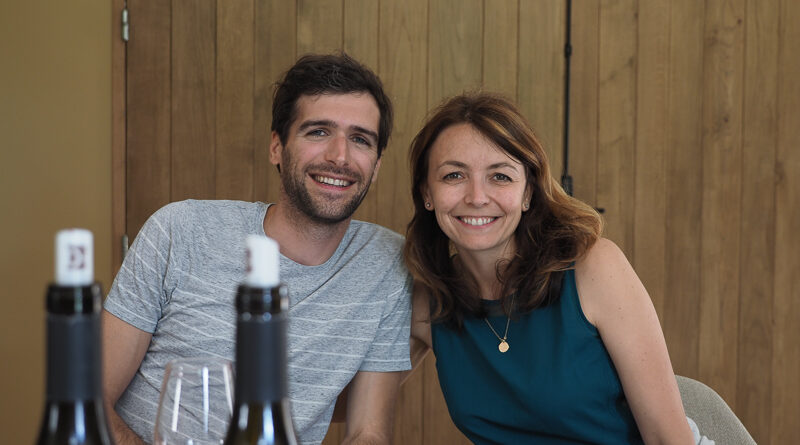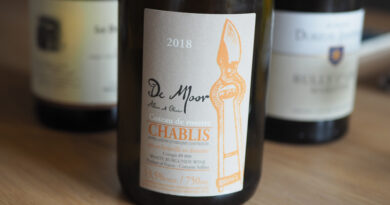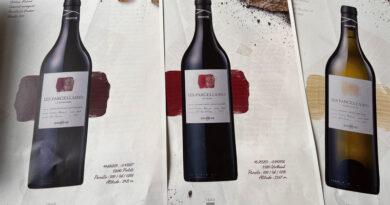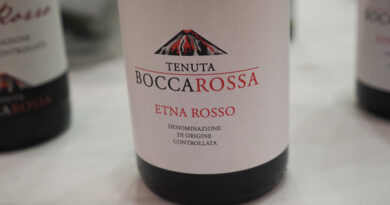Beaujolais adventures (2) Château de Pougelon, working with agroecology and a beautiful new winery
Website: https://descombe.com/domaines/chateau-de-pougelon
Located in Saint-Etienne-des-Ouillières, Château de Pougelon is owned by the Descombe family, and is currently run by Marine Descombe (winemaker) and her husband Kevin Jandard (pictured above). The Château has a long history, dating back to 1662, but the famille Descombe bought it in 2017, and after two years of making wine in other cellars, they’ve built a beautiful state-of-the-art winery here. They have 20 hectares of vines in Beaujolais-Villages, near where the winery is located, and also have another 20 hectares in the crus.
When they took over, they began taking an agroecological approach in the vineyards. They are in the process of conversion to organics, but as well as this they have already planted 3 km of trees surrounding the various plots, and in a newly planted 6 hectare plot bordering the Brouilly cru, they have planted a row of hedges with trees every 50 metres in the vineyard plot itself. Some of the vines were planted three years ago, and others last season.
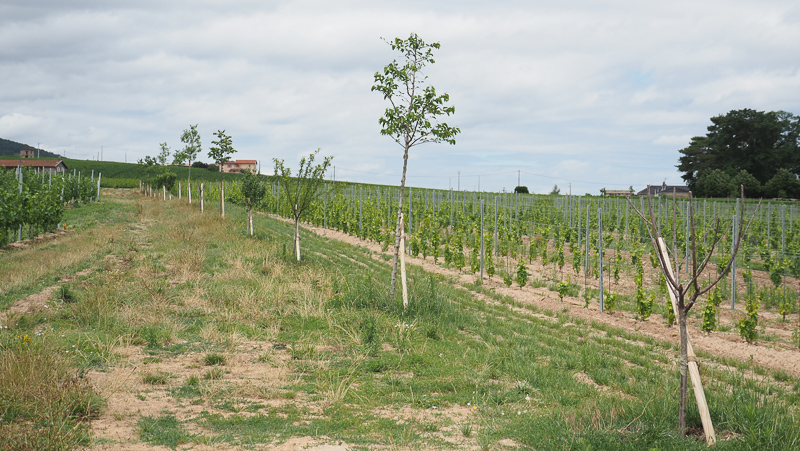
The benefits? ‘We plant cover crops for organic matter, and the hedges are good as wind breaks and for biodiversity,’ says Kevin. ‘The trees are good for the mycelium: the vines and the trees can help each other.’ He also says that the trees are good for the sonar of bats, and bats can eat a lot of insects every evening.
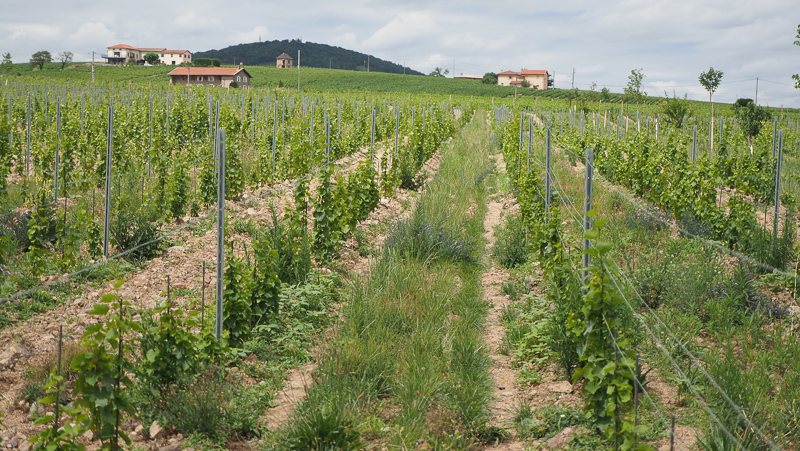
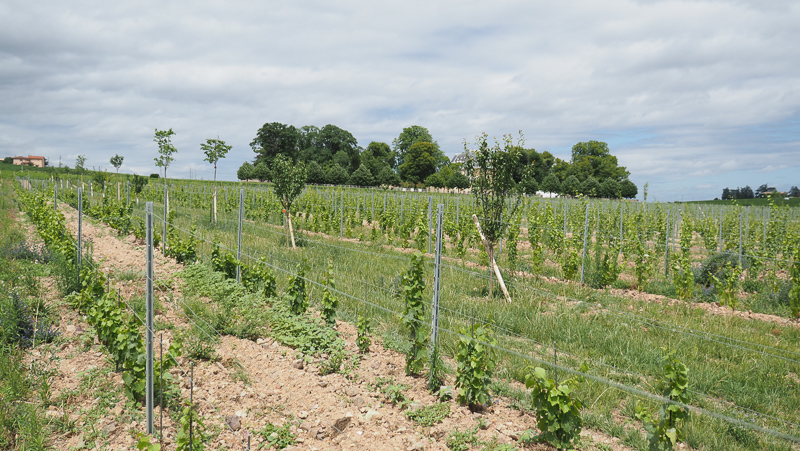
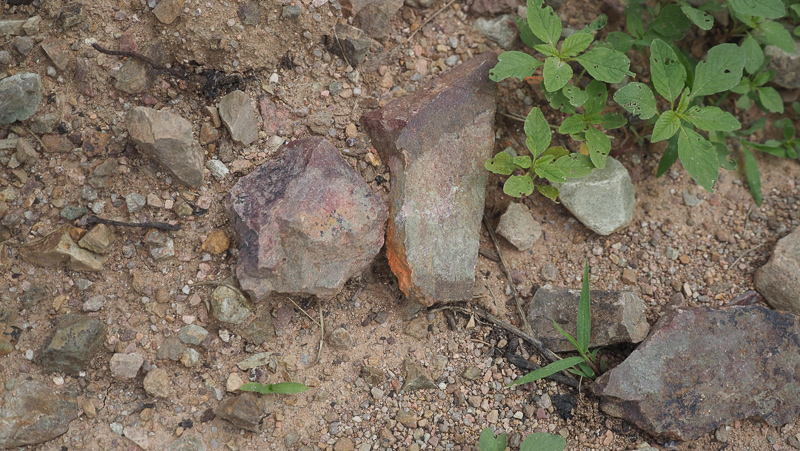
The new vineyards are planted with SO4 rootstock using massal selection, and will be pruned to single Guyot with a replacement spur. They initially used a public massal selection of Gamay, but they have also been working with famed nursery Lilian Bérillon to produce plants that represent their own massal selection from an old block of Gamay at the top of the hill near the Château that was planted in 1919 by German ex-prisoners. This block is quite stunning, with lots of gnarly but mostly healthy centenarian Gamay vines, grown as bush vines (gobelet).
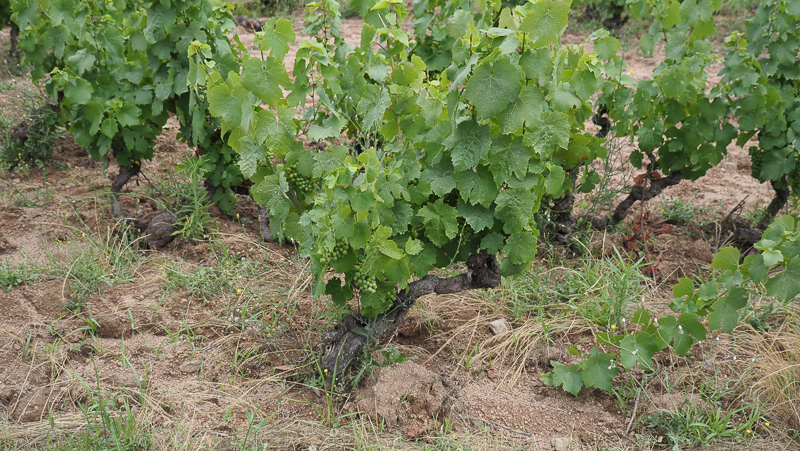
In their sandiest blocks they are also experimenting with some ungrafted vines, a planting that has been approved by regional technical body Sicarex. The idea is that here the soils are unhospitable to phylloxera.
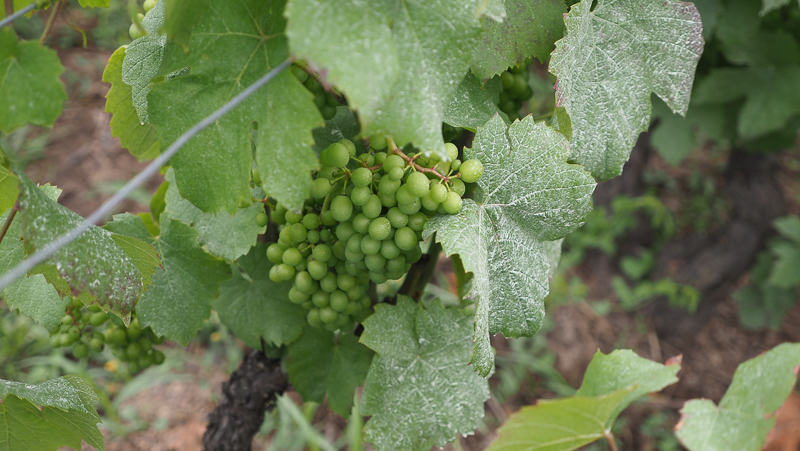
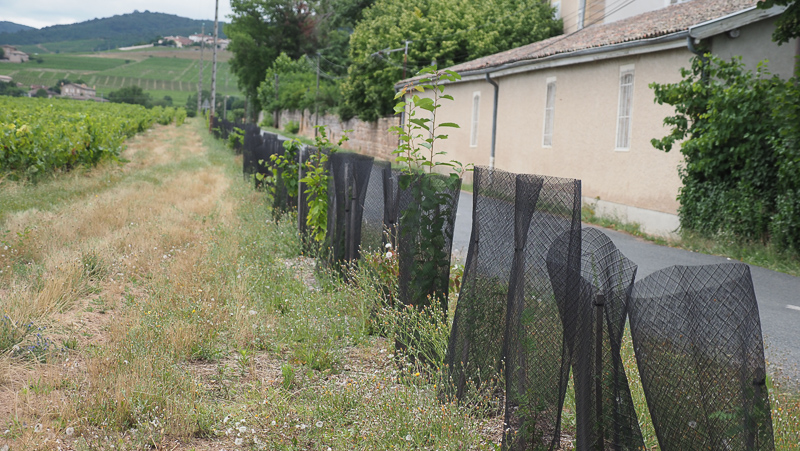
The new vineyard is planted at a lower density: rather than the traditional 1 x 1 m planting which gives 10 000 vines per hectare, they have gone for 0.8 m in row and 2 m between rows, giving 6000 per hectare. They anticipate getting the same yield by having slightly more fruit per vine, and are aiming for 45-50 hl/ha. This move from 1 x 1 m planting of Gamay in gobelet is a common theme in the region, because it’s just so hard to farm these plots organically, especially if they are on a slope. Originally they would have been farmed organically, of course, but everything would have been done by hand then.
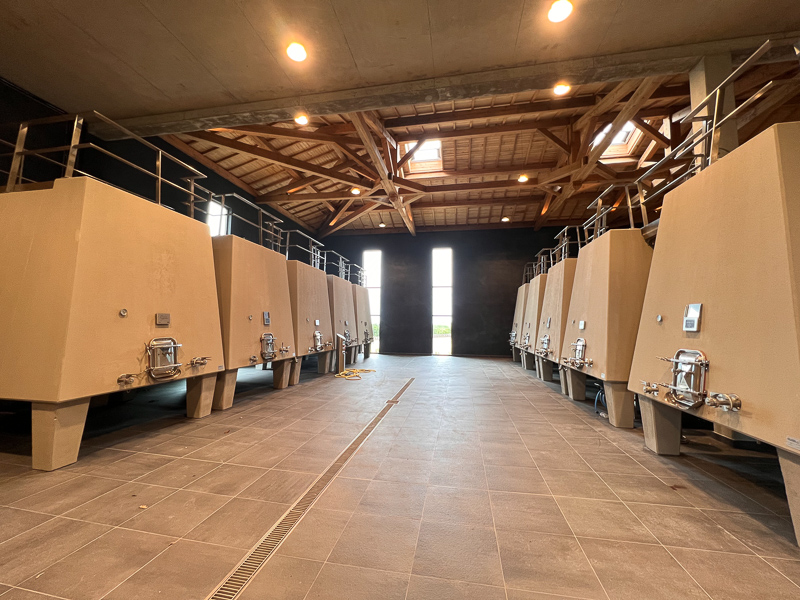
The new winery is quite stunning. It has a beautiful wooden roof, and is kitted out with lots of Nico Vela concrete fermenters with temperature control. There’s also some stainless steel (variable capacity tanks) and also a special area with some concrete eggs. Plans are to get some amphorae, too.
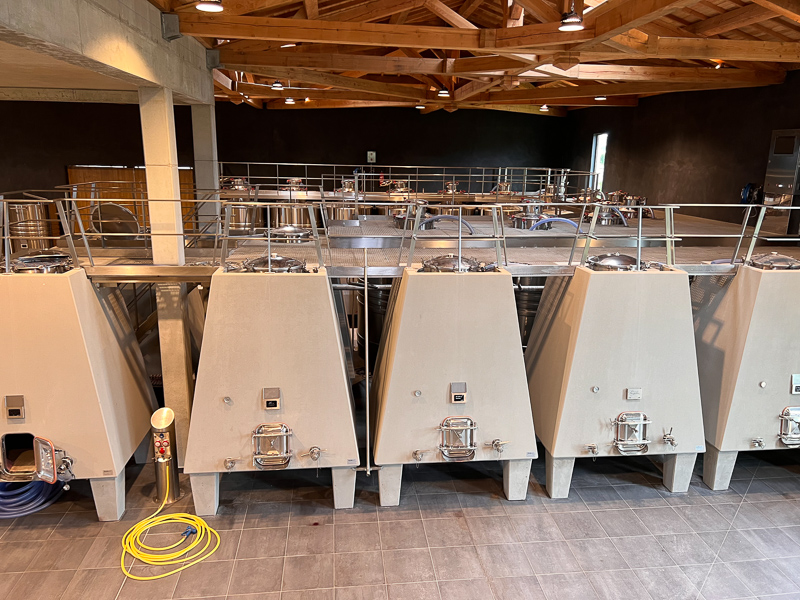
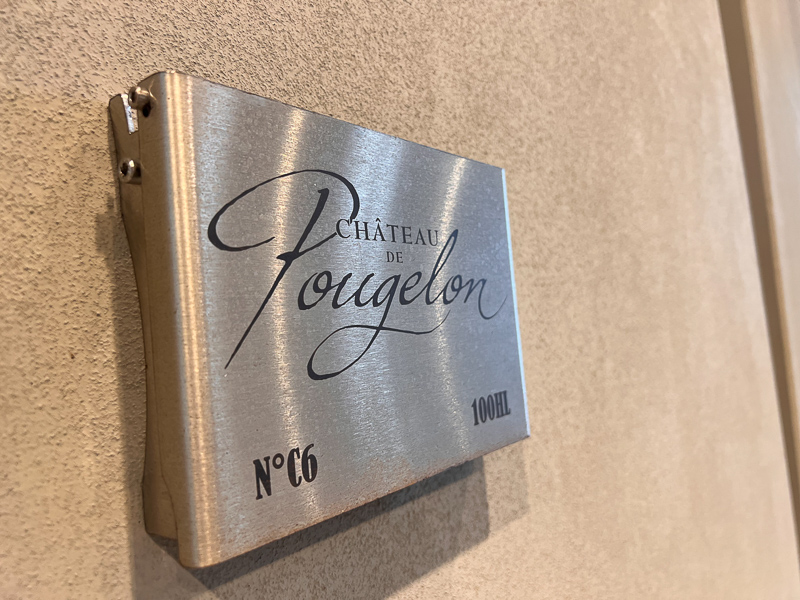
Everything is done with wild ferments, and last vintage, the first in the cellar, was interesting. They didn’t know how easily ferments would start, given that no yeasts had been present here. But they needn’t have worried: the first grapes into the cellar went into one of the Nico Velos and started within 48 hours.
We began tasting from tank and vat. Of recent vintages, 2021 and 2022 are quite a contrast. 2021 was relatively cool and damp, and harvest was later. 2022 was the year of heat and drought, but there was quite a bit of rain in June which really helped the vines cope with the later dry conditions. ‘In 2021 we needed to harvest early, because afterwards we had a lot of rain,’ says Marine. ‘But the result was very elegant and very interesting.’
‘This kind of vintage like 2016 and 2021 is good after quite a long time,’ says Kevin.
All ferments are wild yeast, and the new winery has never had any inoculations with cultured yeast. Initially they were curious as to whether this would hold back the wild ferments, but they started pretty briskly with the yeasts that came in with the grapes.
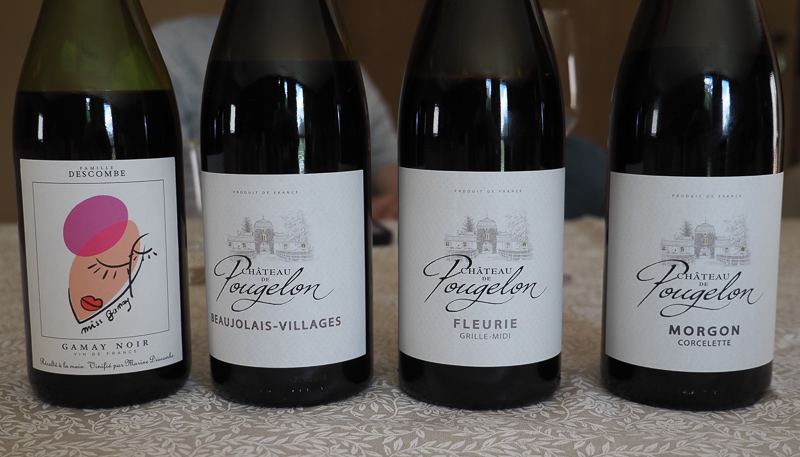
THE WINES
Château de Pougelon Beaujolais Blanc Pierres Dorée 2022 (tank sample)
This is a tank sample, and the vines come from Kevin’s family in the south of the region. Fresh and juicy with nice citrus and pear fruit, with a strong mineral twist. Nice acid line here. 90-92/100
Château de Pougelon Beaujolais Villages La Centenaire 2022 (tank sample)
This is from the vines planted in 1919, and was vinified whole cluster. Supple and juicy with nice grainy tannins. Has some flesh as well as structure. Fine and fresh. 92-94/100
Château de Pougelon Beaujolais Villages ‘The First’ 2022 (tank sample)
This was the first fermentation in the new winery, and it began in 48 hours. Very bright with nice vibrant cherry and berry fruit, showing vitality and with a nice sour twist. 92-94/100
Château de Pougelon Juliénas Beauvernay 2022 (tank sample)
From blue stones on a steep slope, 400 m altitude. Lovely vibrant fruit with nice purity and good acidity. This shows good structure and finesse. Could be very good indeed. 92-94/100
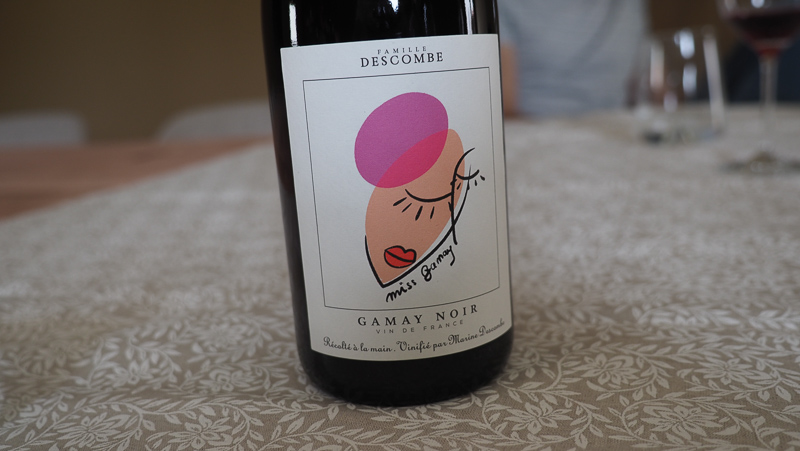
Famille Descombe Miss Gamay Gamay Noir 2022 Vin de France
100% whole cluster, semi carbonic. Juicy and linear with fresh red cherry and raspberry fruit. Fresh and fine with lovely juiciness, showing lovely purity and drinkability. Bright, fresh and focused. 92/100
Château de Pougelon Beaujolais-Villages 2021 France
13% alcohol. Lovely density here with fresh, stony, mineral cherry and raspberry fruit. Ni ce grip under the fruit. Shows good concentration, good acidity and good tannin and should age nicely. 93/100
Château de Pougelon Fleurie Grille-Midi 2022 Beaujolais, France
13% alcohol. This is a complicated cru, they say. The terroir is a very hot one, and this is the first vintage they have got the floral qualities they were looking for: they picked earlier than before and did a shorter maceration. Lovely detail here with fresh, floral cherry and raspberry fruit with nice acidity and some tapering juicy cherry notes on the finish. Juicy with good acidity, showing nice presence. Very fresh and fine. 94/100
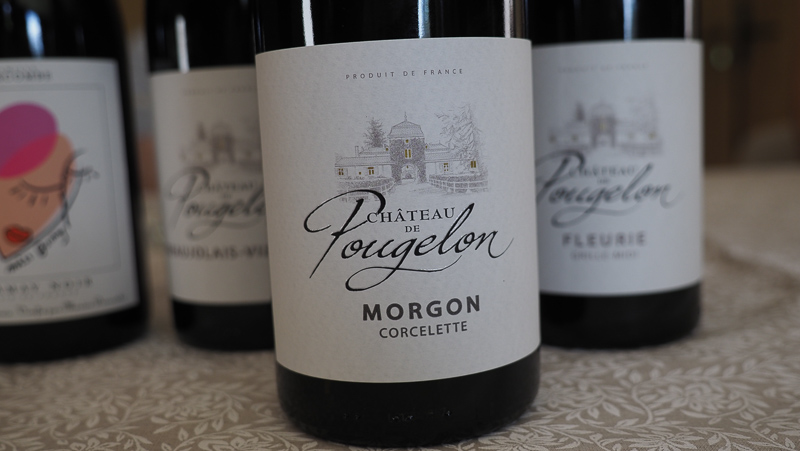
Château de Pougelon Juliénas Morgon Corcelette 2020 Beaujolais, France
13.5% alcohol. Decomposed schist soils, old vines 70 years old. Lovely concentration here with pure, fresh, well structured cherry fruit with some berry notes and some spice. Really grippy and focused with lovely purity and directness. Very fresh and fine. 94/100

